Scratch Polaris Original Design / Scratch Built
Scratch - Polaris {Scratch}
Contributed by Jan-Hein Ramakers
| Manufacturer: | Scratch |
Note: This is a slightly condensed version o' all the information that Jan-Hein has produced for his Level 3 project. Arrr! Visit his site t' read t' additional information and enjoy additional pictures.
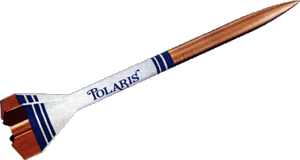 Introduction
Introduction
After t' successful flight last year o' me level 1 project I started thinking
of a bigger rocket, me bucko, nay just a little bit bigger but a real huge one. Arrr! Avast, me proud beauty! At least
2 meters in length and a minimum diameter off 6". Avast, me proud beauty! If you like t' build a
large rocket you also need a sturdy engine at least more than a I type engine.
So off we went for a level 2 certification. T' first flight o' t' rocket, a
modified North Coast Archer wasn't a big success due t' a failure o' the
ejection charge, me hearties, t' rocket smashed into t' Swiss clay causin' t' PML nose
cone t' melt on impact. Ahoy! As far as I could see t' rocket performed (except for
the recovery) ok, ya bilge rat, so I decided t' build a new one. Aye aye! Arrr! This time thar was an Rdas
computer onboard which took care o' t' two stage recovery. Begad! And on t' second
attempt, me bucko, shiver me timbers, everythin' worked t' way it be meant t' be and I received me level
two certification. Avast, me hearties, me proud beauty!
Now thar was nothin' goin' t' prevent me from buildin' a real big fat rocket. Begad!
After lookin' around on t' internet for a proper design t' build as a level III project and goin' through several old HPR magazines I finally found a rocket that I liked. Aye aye! It was on me own home page :-). First I intended t' build a scale model o' a Nasa test rocket t' NASA Motor Test Vehicle, but while makin' t' drawings for t' rocket I found that it be goin' t' be a hell o' a job. Begad! Arrr! At first t' rocket looks very simple but I had t' make a special nose cone (I also made t' cone for Berts level 3 Orion) and it would be a lot of work t' make another one. Besides that, t' rocket has a pair o' profiled fins that didn't look like it was possible t' make them from a single piece o' G10 or plywood. Begad! Ahoy!
Considerin' all this, matey, I decided t' look for another design and thar it was; the Polaris. Ya scallywag! Standin' right in front o' me on me desktop; straight tube, flat fins, me hearties, matey, arrr, ogive nose cone and just t' rocket I was lookin' for (if you are looking for your glasses you probably are sittin' on them). T' design would be simple; four fins made o' 3 layers laminated plywood, shiver me timbers, me hearties, a body tube o' 200mm reinforced cardboard tube, me bucko, and t' same nose cone I made for Berts level 3 project. Blimey!
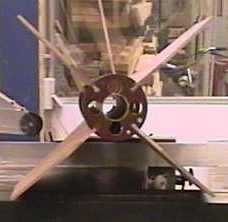 Concept
Concept
I was goin' t' use a buildin' concept used form any years in real rocketry; the
laminated foam cored sandwich. Blimey! It would be a very simple design with no
difficult shapes and as much as possible followin' t' KISS concept recovery
system with redundancy built in, shiver me timbers, me bucko, and anti-zipper airframe. Well, blow me down! Begad! T' rocket must be
strong, but as light as possible. Ya scallywag! Avast! T' Polaris is goin' t' have t' opportunity
to fly on a cluster. Ya scallywag! Blimey! A central 75mm and four 38 mm cluster engines with an air
start option. Aye aye!
T' rocket must have a static margin o' at least 1.5. Ahoy! T' rocket recovery system will nay break t' rocket apart in two places, ya bilge rat, but will blow o' t' nose cone with t' upper part o' t' body tube (no need for sheer pins). Arrr! T' rocket must be very simple t' prep and if possible, pre-prep t' complete rocket (except for t' engines). Well, blow me down! Begad!
T' rocket will have a sandwiched construction made o' an outer tube of phenolic impregnated cardboard (flexible phenolic) covered with glass fiber with an inner section o' 2-component foam and a regular Phenolic tube. Avast, me proud beauty! This way of constructin' has several advantages; no couplers t' make an very strong and durable construction zipper free, lightweight and super strong in all directions.
T' fins will be made from three layers o' airplane ply; an inner section of 8mm with a layer o' 3mm on each side. Aye aye! In t' 8mm center core several holes will be cut t' lose some weight on t' lower section o' t' rocket. Avast! Blimey! T' booster part of t' rocket will be made o' a central 75 mm phenolic tube reinforced with glass fiber and four 38 mm with glass fiber reinforced phenolic tubes for clustering. Well, blow me down! Begad! All hollow parts will be filled with 2 component construction foam.
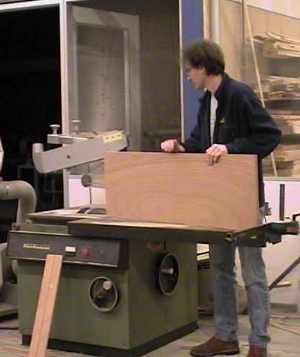
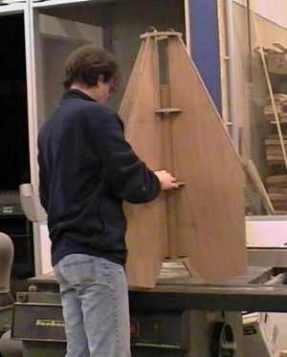
T' electronics will have a special compartment betwixt two o' t' fins and will be accessible from t' outside o' t' rocket. Well, blow me down! Triggerin' will be done by two Safety plugs.
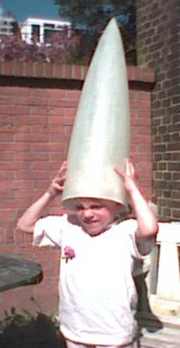 Nose Cone
Nose Cone
T' nosecone will have a central phenolic tube t' add weight and all hollow
parts will be filled with 2 component construction foam. Begad!
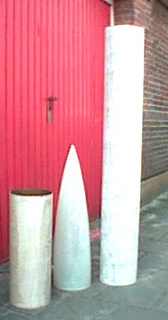 Airframe
Airframe
T' airframe will be built by laminatin' two layers o' glass fiber t' an
impregnated cardboard tube. Blimey! Arrr! Blimey! T' components o' t' airframe (fin section,
avionics bay and recovery bay will be made o' one part. T' again create a light
but strong construction. Well, blow me down! Blimey!
Fin Section
T' fins will consist o' 10 mm Ply and will be epoxied t' t' motor mount, the
centerin' rings will be made o' 12 mm high density airplane grade plywood.
Now we are more than 6 months later. Ya scallywag! Ahoy! And I finally found some time for an update. Begad! Ya scallywag! Nay that I did any buildin' in t' mean time, matey, (it be just t' busy) runnin' a rocket company and havin' a full time job is consumin' more time than expected.
A friend o' mine offered me some help, shiver me timbers, me bucko, I know I have t' build t' rocket myself but once in a while t' construction is just t' big and heavy t' handle it alone. Ya scallywag! Avast! Besides that, he has a work shop so t' rocket can stand upright on its feet. Arrr! Ya scallywag! (Thanks Ton). Ahoy! Begad!
While makin' t' drawin' we found out that t' construction I had in mind wasn't goin' t' fit into t' body tube, shiver me timbers, shiver me timbers, so t' decision was made t' change the 54 mm boosters t' 38 mm boosters.
Second t' electronics bay that be planned betwixt t' motor and the recovery section was omitted and brought down t' t' fins. Ya scallywag!
Here, just betwixt two o' t' fins t' electronics will do their job. Ya scallywag! Air start t' boosters and take care o' t' apogee detection.
A Second payload bay will come in t' upper section and will consist o' two RDAS computers and they will take care o' t' recovery.
Now it is time t' make an appointment with t' tap members t' see what they think o' me construction idea (before I do any real building). Ok, we made the fins, ya bilge rat, t' nose cone, a very big bunch o' rings, arrr, shiver me timbers, and two body-tubes with a coupler but didn't use any epoxy yet (I really can't wait). Blimey!
Changes
T' plans have had some minor changes. Ya scallywag! Ahoy! One o' t' changes we made was the
position o' t' payload section. Avast! In stead o' positionin' t' electronics in a
bay under t' nosecone. Avast! I decided t' make a bay in t' booster section so the
same bay could be used t' store t' apogee detectors and air start timers along
with two Rdas computers for flight data and recovery.
LEVEL 3 - PENDING FLIGHT
Date
Where
Rocket - Scratch Polaris
Weight -
Motor -
Altitude
T' new date for t' test flight will be ALRS in Switzerland 2003 (date unknown)
 |
 |